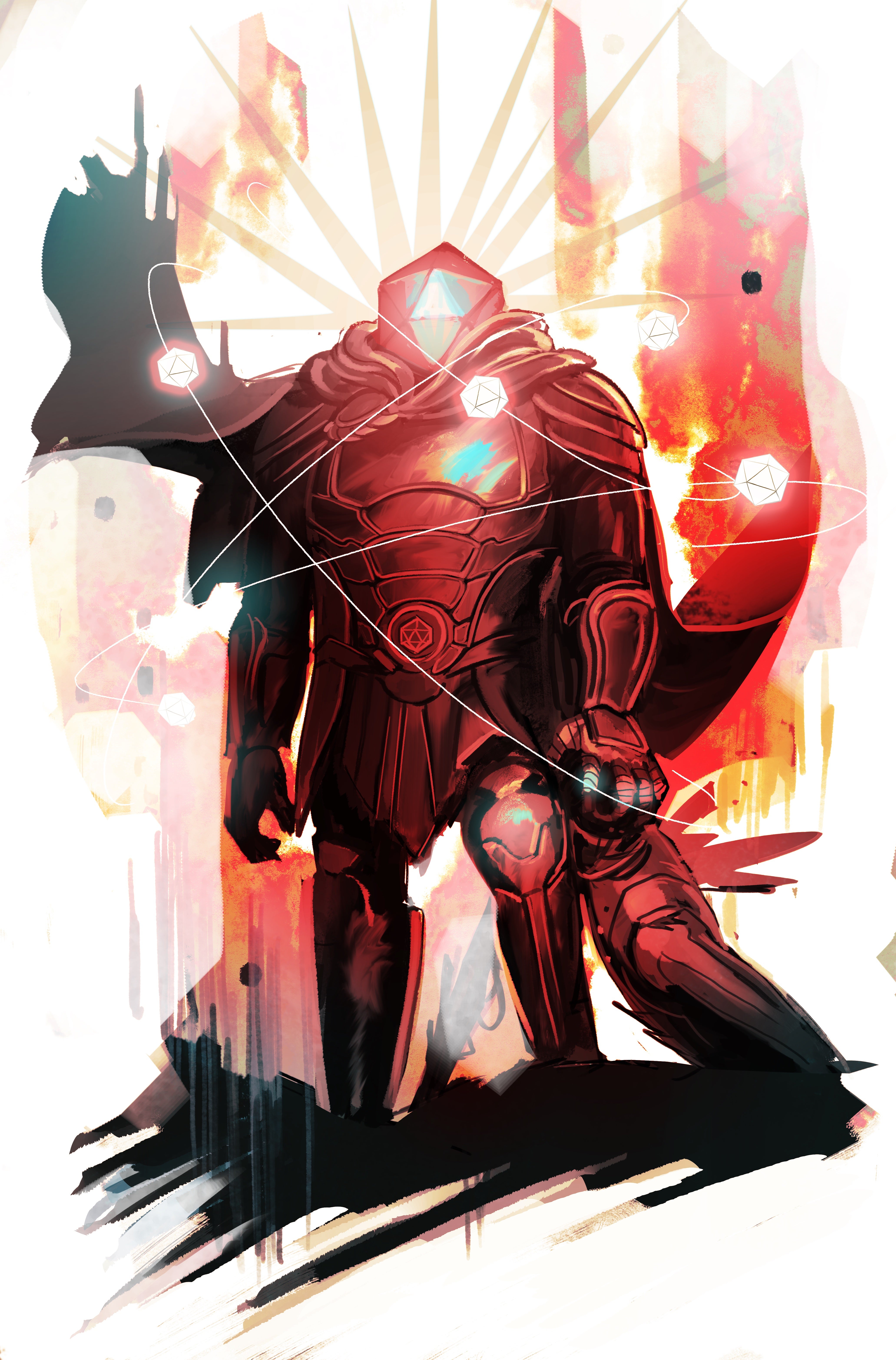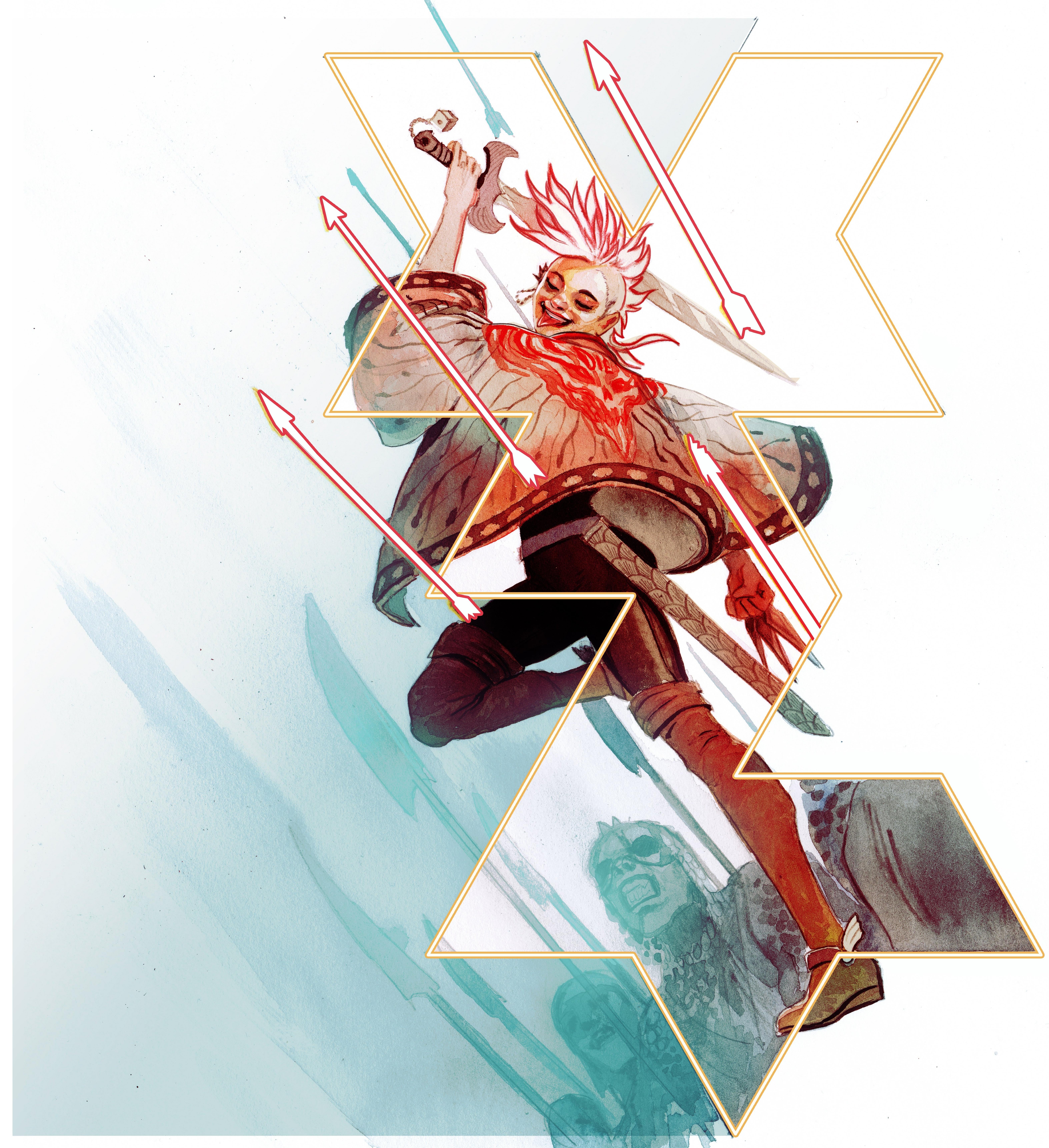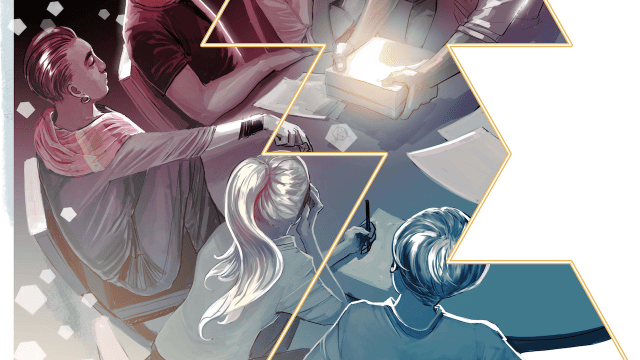You really haven’t attended a chaotic interview until you wake up at 8 a.m. to speak to game designers and comic writers in the UK, only to have them talk about the merits of Chicago pizza versus the more “traditional” New York style. Kieron Gillen (DIE, The Wicked + The Divine, and many, many more) is married to an Italian woman, and he has opinions. “It’s just cheese on toast,” Gillen said.
“Please,” intoned Grant Howitt (Spire, Heart), a game designer and co-founder of Rowan, Rook and Decard, in the rather woebegone voice of a man who has seen too much shit on Twitter and doesn’t want to see any more. “Don’t tell the internet that Kieron Gillen thinks pizza is just cheese on toast.”
Gillen, seeing his friend in pain, and clearly delighted by the utter absurdity of this interview already, chuckled. “You’ve caught me in a mischievous mood today,” he said.
The DIE RPG Is a Ritual
Earlier this week, I sat down with Gillen, Howitt, and Zach Cox, who are leading the DIE RPG team. Gillen is the writer of the original Image comic series (which was created alongside artist Stephanie Hans, who was commissioned to illustrate artwork for the RPG as well), which sees childhood gaming friends return to the table to play another session of a fantasy tabletop roleplaying game as adults, only to get literally sucked into the fantasy world once again. Think Jumanji meets D&D. As an RPG, DIE follows more or less the same storytelling framework, where you create a mundane real-world persona who gets sucked into the game. Howitt is a game designer, but for this game he’s describing himself more like a ringleader — Gillen has already published a beta version of the DIE RPG, based on rules included in the back pages of issues of the comic, and at nearly 150 pages, it was already the size of a core rulebook.
“Yeah, I can’t shut up,” Gillen said, looking absolutely pleased with himself. “We’ve hired extensive teams of people to get him to shut up,” Howitt responded.
Gillen continues–he actually turned in about 400,000 words to Howitt and his team. That’s about three rule books worth of information, and he just handed it over. “Then we’d read it and we’d say ‘this is cool, this is good insight on how to play a version of this game’ but DIE is a very simple game,” explained Howitt. “The rules and the classes are maybe 10 pages. And we’re not outlining a setting because the whole point of DIE is that it’s your own adventure. The book is a lot of advice on how to make something — the rituals you need to go through in order to play the game.”
This is a magic word for the game designers: rituals. The instructions needed to pass down knowledge, so that anyone can repeat the ritual in order to create their own outcome. A lot of the work to get DIE out there involved slowly chipping away at the core ideas of the game. “So much of DIE is about the democratization of storytelling and ideas,” said Gillen. “Us saying to the player, ‘This is simple and you can do it.’ Which is what RPGs are about, too.”
When I asked for an example of a ritual, Gillen explained. “There’s this part where we describe how to create novelty. It’s idea plus separate idea equals novelty.” Imagine a group of gorgons, but instead of just monsters, they’ve got the same attitudes as the mean girls in high school. “Kind of upset you’re spreading that around,” Howitt interrupted. “We need to have jobs, Kieron. We need to eat. We can’t just tell them.”
This is kind of the point, in a way. With three core books of material the game designers had to figure out what they did want to tell and what they wanted to hold back. Not because they need jobs, but because in order to create a great rulebook for an RPG, you need to leave room for the player to do their own work. You need space for their own rituals to take over. Idea + idea = novelty. Bring your own ideas.
They’re More Like Guidelines Than Rules
“The more you try to explain, the less you end up explaining,” said Gillen about the massive amount of text he turned over. “My desire to be all things to all people is not useful. People want a guideline and then they’ll do whatever they want to do anyway.”
He describes the two tentpoles of the game. You create your mundane persona, you create the character that persona would create, and you get sucked into the game. At the end of the game — not just the game your persona/character has been isekai’d into, but how DIE itself is supposed to end — you and your friends have to decide whether or not to return to the real world. It sounds simple. Gillen agreed: “The simplest way to put power back in people’s hands is to remind them that they have power.”
“With game design, much like with story structures,” Gillen said, “knowing that you have the start and the end makes it so that anything that happens between the two becomes the story. We establish these two poles so that the players get a lot of narrative freedom, but they are still playing towards a meaningful ending.”

Howitt agreed. “We wanted this book to provide a crisp set of guidelines to create something entirely specific for the group at a table.” When the fantasy world you’re playing is laid out like the sides of a D20, where each facet is triggered by a trauma or an understanding that the mundane character brings into the fantasy world, you have to find ways to bring those stories at the table. “We’re not giving you a sandbox,” Howitt said. “We’re trying to teach you how to control your story in a much more direct way. We’re showing you how to make things.”
“There’s a frantic desire within a lot of RPG adaptions to offer a way to understand the original material so that you can go into that world and break it apart,” Howitt added. What the DIE RPG book is doing is different, creating a way in which you can make your own DIE story, rather than emulating the story of Gillen and Han’s comic. “What we’re working on,” Howitt said, “is a machine to manufacture heartbreak. Which is much harder to do, and usually sells worse.”
The Mind-Body Problem
In order to create a DIE RPG that teaches people how to create DIE (their RPG), Gillen said that the team had to find the iconic elements that make up DIE: strong character elements, the questions inherent within the creation of fantastic personas and mundane players that the real-world players have to answer at the table. “All the players have complete autonomy to define anything about themselves in the real world,” Gillen explained. “Because there is a lot of interplay in between the storygame conversation of the mundane world, and the mechanical wargame model of the fantasy world.”
As I asked about the ways in which conversations and games differ, Gillen laughed. “I promised Zach and Grant that I wouldn’t use the word ‘Cartesian’ in this interview, but I’m going to blow it in the first five minutes.”
Gillen is referring to the illusion of the duality, or separation, of the mind and body, a philosophical argument most famously defended by René Descartes. In simple terms, thoughts can exist outside of the body, and the body itself cannot think. “The second you describe DIE as ‘You’re people in a game playing a game, playing a game’ it becomes weirdly distancing,” Gillen noted, “But in reality, DIE is emotional, immediate, and affecting. When people make the persona verses the player they get to the heart of human roleplay, but this is, of course, really fucking meta.”

Implicitly, by developing a real-world persona for your mundane character who plays games with their friends, you are asking players questions about why people play games in the first place. “Inevitably, some of your own thoughts and ideas will end up creeping in as you try to figure out why any of these people started out with roleplay in the first place,” Gillen said.
Gillen continued, “This is like the most basic meta-level of the game,” as Howitt groaned in the background. “Dear god,” Howitt muttered, “the most basic meta-level. Listen to yourself.” I, personally, love it. I’m having a blast. I’m on my first cup of coffee and I’m discussing “the most basic meta-level of gaming” and Cartesian dualism first thing on a Monday morning.
“We lean into the meta of it,” Gillen said, clearly unbothered by the accusation that he’s being too meta. “The rituals of gameplay. The final act of the game is when everyone says, out loud, ‘the game is over,’ and then it is. And if you say that after playing for months, that can be really fucking heavy.”
What Are You Going to Do About It?
DIE will always put pressure on the characters you play to figure out who they are and what they want from not only the game, but from their own lives. And at the end of the game, before you say “the game is over,” the characters have to decide as a group whether they are going to leave the world they’ve created or if they’re going to stay in the fantasy. “If you don’t agree, the world ends,” Gillen said. “The question isn’t ‘If we don’t agree what are we going to do?’ but it becomes ‘what are you willing to do?’”
I think that this is a really elegant way to end a game — you bring it back to the very basic mechanics of problem-solving within roleplaying games. What are you, the character, going to do about this problem? What are you, the player, going to agree to do with the other players at the table? Roleplaying games are about asking questions and finding answers, and in DIE, the questions become about you. DIE is, ultimately, a game about why we play games, Howitt reflected. “We’re always circling back to the core ideas that ground these moments of decision — the decisions we make when we play games.” Within the game, every piece of progress become a ritual. To fight, roll a die. To cry, say so. To live, save your friend.
“Writing this was in part a process of discovery,” Gillen concluded. “It’s about every game I’ve ever played. In order to create this RPG, I had to explore why I play RPGs.” It’s Cartesian, I think — it all comes back to the same problem. Can you exist outside of the game? Can the game exist outside of you? DIE is the mind, you are the body. Or maybe it’s the other way around?
The DIE RPG is crowdfunding through Friday, June 10th, 2022.
